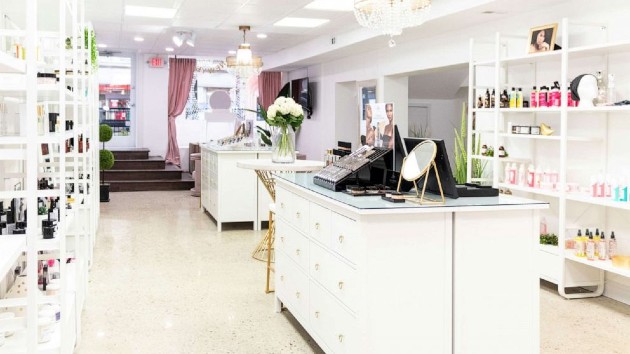
Courtesy of The Brown Beauty Co-Op
 Courtesy of The Brown Beauty Co-OpBy JACQUELINE LAUREAN YATES, ABC News
Courtesy of The Brown Beauty Co-OpBy JACQUELINE LAUREAN YATES, ABC News
(NEW YORK) — As we close out Black History Month, it’s paramount to highlight and celebrate significant contributions made by African Americans across all categories.
One area that hasn’t always been illuminated in textbooks is the number of revolutionary beauty inventions, innovations and businesses from people of color.
Personal care, grooming and beauty are big business markets and statistics continue to show how willing consumers of color are to buy products that fit their specific needs.
Black households spend 7% more on hair care annually than the U.S. average, with $82.50 spent per year for a Black household versus $77 spent per year for an average household, according to results taken from a NielsenIQ Total U.S. Homescan measurement.
Also, the Black hair care category within mass retail accounts for $1.2 billion in annual sales, outpacing the total hair care category’s growth 3-to-1, as of December 2020, according to Strategic Solutions International.
“Black beauty has always been historically trendsetting, whether you think about styles like braids or beauty trends like full and luscious lips,” Amaya Smith, co-founder of The Brown Beauty Co-op, a Washington, D.C.-based retail space primarily catering to “brown girl approved” products and DIY-style services, told ABC News’ Good Morning America.
“Beauty has been an outlet of expression for many people of color who often are marginalized by society — as a way to express ourselves and have pride in who we are,” she added. “When you think of spaces like beauty salons — there is also a lot of community within the beauty and grooming space. Black beauty is a huge cultural expression and part of who we are and I think it will always be a mainstay in our community.”
Additionally, Black shoppers strongly prefer to support Black-owned brands: 39% of Black consumers indicate they want to increase purchase from Black-owned brands, as of July 2020, according to SSI.
Inspired by the demand, tech-forward digital retailers such as AMP Beauty LA have emerged to house and curate Black-owned brands for beauty lovers of color.
“We’re currently curating the largest offering of Black-owned brands across hair, skin, body, bath, makeup and nails, and we want to acknowledge the indispensable role that Black beauty brands have as constant sources of creativity and innovation in beauty by amplifying their voices,” Angel Lenise, AMP Beauty LA president and chief brand officer, told GMA.
Echoing Lenise’s, acknowledgment and amplification of the unique contributions Black people have had to the beauty industry is something that can’t be ignored.
Scroll down memory lane as we’ve underscored brilliant beauty innovators, inventions and highly favored businesses made possible by talented people of color:
Lyda Newman’s synthetic hairbrush
African American hairdresser, inventor and women’s rights activist Lyda Newman is behind an improved model of a version of the bristle brush used today. She applied for the patent on the new style of the hairbrush in 1898, and the design was created “to provide a new and improved hair-brush which is simple and durable in construction, very effective when in use, and arranged to permit of conveniently cleaning the brush whenever desired.”
Madame C.J. Walker, beauty entrepreneur and self-made millionaire
It’s almost impossible to have a conversation about Black beauty and business without mentioning Madam C.J. Walker. The pioneering businesswoman promoted, sold and trademarked hair products in the early 1900s specifically geared toward the needs of Black women. She became the first Black female millionaire in America, according to History. She also employed lots of “beauty culturalists” to sell her products.
Anthony Romani, Samuel H. Bundles Jr., Henry M. Childrey
In 1970, Samuel H. Bundles Jr. and Henry M. Childrey (Tulloch) patented the iconic Afro pick comb. The comb is mainly used for tightly coiled afro hair, and was later designed to include a fist on the handle as a symbol of peace and unity.
Fashion Fair
Flori Roberts is often touted as one of the earliest cosmetics companies for women with deeper skin tones. It also was the first brand to be sold in major department stores.
Almost a decade after the launch of Flori Roberts, Fashion Fair Cosmetics was launched in 1973 by Johnson Publishing CEO John H. Johnson and his wife Eunice, and it became the next big beauty brand to cater to women with darker skin. African-American Business Leaders: A Biographical Dictionary highlights that the legendary makeup brand emerged when it was noticed that models for the company’s annual fashion show featuring Black designers and models found it difficult to find makeup suitable for their complexions.
Theora Stephens
Encyclopedia of Hair: A Cultural History points out that a Black woman, Theora Stephens, is behind a more-efficient pressing and curling iron that emerged in 1980 with a design more similar to what’s available on modern-day markets.
Fenty Beauty
Decades after the success of brands such as Fashion Fair Cosmetics, the number of modern cosmetics companies catering to a wide range of complexions was still very limited.
In 2017, Rihanna changed that with her Fenty Beauty launch. The brand was instantly celebrated for its inclusive lineup of products — with the initial foundation launch including 40 shades. The brand has since expanded to include 50.
Copyright © 2021, ABC Audio. All rights reserved.